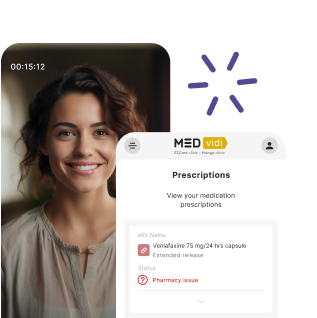Highlights
- Hyperfixation is when you suddenly become interested in an activity, thing, or person to the point where you feel obsessed.
- Hyperfixations tend to fade away as quickly as they come on.
- We need more research to be able to say for sure what causes hyperfixation, but they may be related to the brain differences commonly seen in ADHD.
- ADHD hyperfixations aren’t necessarily negative. If they are causing problems in your daily life, you can manage them through awareness of the pattern, practicing mindfulness, setting time and budget limits, and getting ADHD treatment.
One of the most common experiences that people with attention deficit hyperactivity disorder (ADHD) experience is hyperfixation. If you’ve ever become obsessed with something only for your interest to fade as quickly as it came on, then you may have experienced hyperfixation. Maybe it was a new music band, a creative hobby like photography, collecting something (like mugs or stamps), or even a person in your life.
Hyperfixation isn’t a bad thing — in fact, it can come with many benefits — but it’s important to learn how to manage it so that you can use it to your advantage.

What Is Hyperfixation?
ADHD hyperfixation refers to the intense — and often temporary — interest that people with ADHD can have in a certain activity, hobby, thing, or person. You might become so obsessed with something (or someone) that you lose track of everything else. You might spend hours on that chosen activity and be obsessed with it to the point of neglecting other responsibilities and everyday tasks.
Hyperfixation isn’t among the officially recognized ADHD symptoms. But anecdotally, many people who live with ADHD (or other forms of neurodivergence, like autism spectrum disorder) can relate to having such a prolonged interest in certain tasks.
Symptoms of Hyperfixation
The research on hyperfixation is limited, and there are no clearly defined signs or characteristics of it in the literature. But, in general, ADHD hyperfixation looks like:
- Losing track of time when engaging in your hyperfixation: You might start working on something related to your hyperfixation and get so caught up that hours pass without you even realizing it. It can feel like time speeds up or disappears completely; note that
issues with time perception[1] might also be a sign of ADHD. - Forgetting about basic needs or responsibilities: When you experience hyperfixation, things like eating, sleeping, or taking care of work or school might slip your mind because you’re so busy thinking about or engaging in your current intense passion. Even when you know you should stop, it’s hard to pull yourself away.
- Thinking about it nonstop, even when you’re not doing it: Hyperfixation doesn’t just mean getting lost in something while you’re doing it. You might also catch yourself constantly thinking about it when you’re supposed to be focused on something else.
- Spending a lot of time or money on it: You could dedicate hours each day researching, learning, or engaging in the fixation, or you might impulsively spend money on supplies, courses, or collectibles related to it.
- Suddenly losing interest and moving on: You might be obsessed with a particular ADHD fixation for days, weeks, or even months, only for that interest to disappear overnight. Once it’s gone, it’s hard to understand why you cared so much in the first place.
- Talking about it constantly, even when others aren’t interested: With a regular hobby, you might bring it up in conversation sometimes, but you’re also able to talk about other things. When hyperfixation occurs, you might find yourself steering every conversation toward your current obsession — even when you know the people around you aren’t as interested. It can feel almost impossible to stop yourself from talking about it.
- Feeling like you have to do the activity: You might feel restless or on edge when you’re not engaging in the hyperfixation, almost like you’re experiencing withdrawal or intense craving.
- Finding it hard to balance it with the rest of your life: Hyperfixation can make it difficult to keep up with everything else. You might feel like you’re neglecting other interests or responsibilities, but even knowing that, stopping still doesn’t feel like an option.

How Long Do Hyperfixations Last?
The duration may vary. Sometimes, you could have a hyperfixation that lasts only for a few hours or days, while other times it may last for months or even years. It depends on many internal and external factors, and it may not be possible to predict how long it will last this time — unless you try to proactively manage it.
The specific thing people with ADHD can hyperfixate on can also vary. You might find yourself hyperfixating on a specific TV show or video game one week, then on to learning a certain craft or musical instrument the next.
Difference Between Hyperfixation and Hyperfocus
Hyperfocus is another ADHD-related phenomenon, although
Generally, hyperfocus refers to the state of intense focus that happens when you’re totally absorbed in an activity. You might have a prolonged and extreme focus on your new endeavor even if you typically have a hard time concentrating on other things even for short periods. For example, you may find yourself so engrossed in some task that hours go by without you noticing. Other people can’t get your full attention during such periods, and your overall distractibility significantly decreases. However, once you complete this task, you are no longer experiencing that deep interest and can easily switch to other activities.
People with ADHD can become hyperfocused on other activities, too, even if it’s not their hyperfixation. For example, you might become hyperfocused on cleaning your room once you’ve gotten started.
Hyperfocus is sometimes compared to a “flow state,” which anyone (
However, some people argue that ADHD hyperfocus is more intense than the flow state, and research shows that people with ADHD are
On the other hand, you could think of “hyperfixation” as the long-term subject of that intense focus. For example, a child with ADHD could be “hyperfocused” for hours at a time several days a week because they’re playing a certain video game — their current hyperfixation.
Here is another example to help you better understand the difference:
- A student working on an essay about a historical event may spend hours researching and writing. They may forget to eat and totally lose track of time until they notice the dawn outside the window. However, once an essay is completed, a student just proceeds with other tasks or has a rest.
- On the contrary, if this student gets hyperfixated on the topic, they would continue researching it even after completing an essay. They would search for dozens of books about that historical event, watch documentaries, and discuss it with peers for not hours but weeks.
If you want to better recognize your symptoms and experiences that might be caused by ADHD, our medical team is here to help: you can get ADHD treatment online within 24 hours.

Causes of Hyperfixation in ADHD
We don’t have a lot of research on ADHD hyperfixation, so we don’t know for sure what causes it. It may be related to the way this mental health condition affects the brain.
ADHD influences your ability to control your focus. While we often think of it as a difficulty sustaining attention — and this is certainly a common symptom of ADHD — it’s more like a difficulty controlling when and where to put your attention.
People with ADHD experience differences in their brains, especially in an area called the prefrontal cortex. They also have differences in levels of dopamine, which is a chemical responsible for motivation and pleasure. These brain differences can lead to things like poor impulse control, emotional dysregulation, and more.
These differences could also be responsible for hyperfixation. While we need more research to be able to completely explain the causes of hyperfixation, some potential ones include:
- The lack of dopamine, especially, makes it difficult for people with ADHD to switch from one task to another. If you’re in a hyperfocus state or if the activity you’re currently doing is interesting to you, then it can be very challenging to switch to another task, especially one that’s boring or tedious. The lack of dopamine also makes people with ADHD more likely to constantly seek reward and pleasure. Since the hyperfixation interest feels fun and engaging, this could be a form of reward.
- Emotional dysregulation means that people with ADHD often have a difficult time coping with strong or painful emotions. The hyperfixation interest — and the feeling of reward and pleasure you get from it — could be a subconscious coping mechanism to deal with these feelings.
The Pros and Cons of Hyperfixation
Just like ADHD itself can come with unique strengths, hyperfixation and hyperfocus can also be used to your advantage. These aren’t inherently problematic traits, and there can be pros and cons to being able to hyperfixate on something.
Pros
Some advantages of hyperfixation include:
- It can allow you to develop deep learning and expertise in niche topics. This expertise can make you a more interesting, multi-faceted human being with knowledge in different areas.
- Many hyperfixations are creative, and they can lead you to be motivated to improve and strengthen your creative ability. For example, maybe you’ve picked up a musical instrument due to a hyperfixation.
- When your hyperfixation lines up with work or other responsibilities (for example, maybe you’ve decided to complete a course of study in your hyperfixation), then it can help you become more productive and focused.
- Having these hyperfixations can give you a strong sense of fulfillment and excitement, and make your life more enjoyable and fun.
- There may be some ways to leverage hyperfixation into career success or academic achievements; for example, one may complete projects faster and more efficiently or dig significantly deeper into research for a dissertation.
- It can be a useful coping mechanism for managing stress, boredom, or anxiety (when balanced appropriately).
Cons
Unfortunately, when you can’t control and stop hyperfixation, it can have some negative effects on your life as well:
- One of the biggest drawbacks is the fact that you may neglect important responsibilities, like work, school, chores, or personal care, due to being consumed by an interest. You might simply be uninterested in doing anything else except the object of your hyperfixation.
- You might also neglect restful sleep and self-care by staying up late or skipping meals without even realizing it.
- It may become difficult to maintain healthy relationships, because hyperfixation makes it hard to engage with others. Or you might develop social networks around a current hyperfixation, only to grow distant from them once the hyperfixation has passed.
- You may experience frustration, stress, and anxiety when you’re not able to engage with your hyperfixation.
- Certain hyperfixations can also be expensive. You might overspend on a new particular hobby or interest which can lead to financial strain.
- When you suddenly lose interest, you can leave behind unfinished projects — which can lead to a sense of emptiness or frustration.
When Hyperfixation Becomes Problematic
Hyperfixation doesn’t always cause problems but it is a possible scenario. For instance, you may become so fixated on some activity that you become unable to pull yourself away from it, forgetting about important appointments and errands or neglecting household chores. If you feel like you distance yourself from other people because you only want to discuss something you are currently passionate about or don’t want to communicate with anyone at all, this may strain relationships in the long run.
If your tendency to get completely absorbed into activities has started to cause problems, then it may be the right time to learn how to cope better. Dealing with ADHD hyperfixation doesn’t mean getting rid of your interests altogether. It may just mean managing them in a way where they don’t negatively affect your life.
Managing ADHD Hyperfixation
Here are some ways to manage ADHD hyperfixation in a way that maintains self-compassion.
Practice Mindfulness
To deal with hyperfocus and hyperfixation, you may try mindfulness practices. Mindfulness means staying aware of each present moment rather than getting lost in unwanted thoughts. The practice of mindfulness can help you reflect on the why of your hyperfixation. You can learn to notice the urges early on and reflect on whether engaging in a certain enjoyable task right now would be helpful or harmful to other areas of your life.
Set Aside Time and Budget
It’s okay to spend time and resources on your hobbies. But to prevent yourself from overdoing it, it can be helpful to set time limits and a certain budget for your ADHD hyperfixation. For example, it can be a certain number of hours every day — when you don’t need to be productive at work or school. Or maybe, when you’re planning your monthly budget, you set aside a certain amount of disposable income that you allow yourself to spend on the hyperfixation. This can help prevent any regrets that might come up for you once the hyperfixation has passed.
Think of It as a Strength
Try to focus on the “pros” of ADHD hyperfixation rather than thinking of it as a deficit. For example, how do your past and current hyperfixations make you a more interesting human being? What communities have you connected with due to your hyperfixations? Is there a way to leverage all of the knowledge you’ve attained for work or school?
However, if these self-help tips seem to not be enough, consider seeking professional help.
Get ADHD Treatment
Hyperfixation is only one sign commonly associated with adult ADHD. If you have other symptoms as well and find it challenging to deal with them on your own, MEDvidi is here to help. During the initial online appointment, you’ll go through a detailed symptom assessment and receive a personalized treatment plan for ADHD, which may include medication and/or talk therapy. Both have been found to be effective in helping people with ADHD thrive at work and in their personal lives.
Hyperfixations are part of ADHD, but they don’t need to be a drawback. Make an online appointment today to learn how to manage ADHD symptoms, prevent negative consequences, and feel your best.












